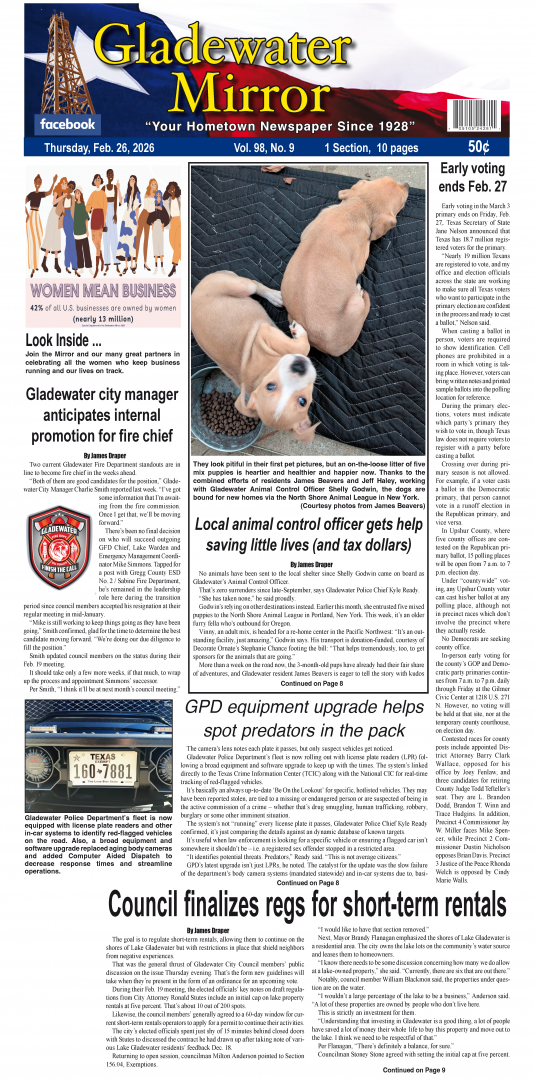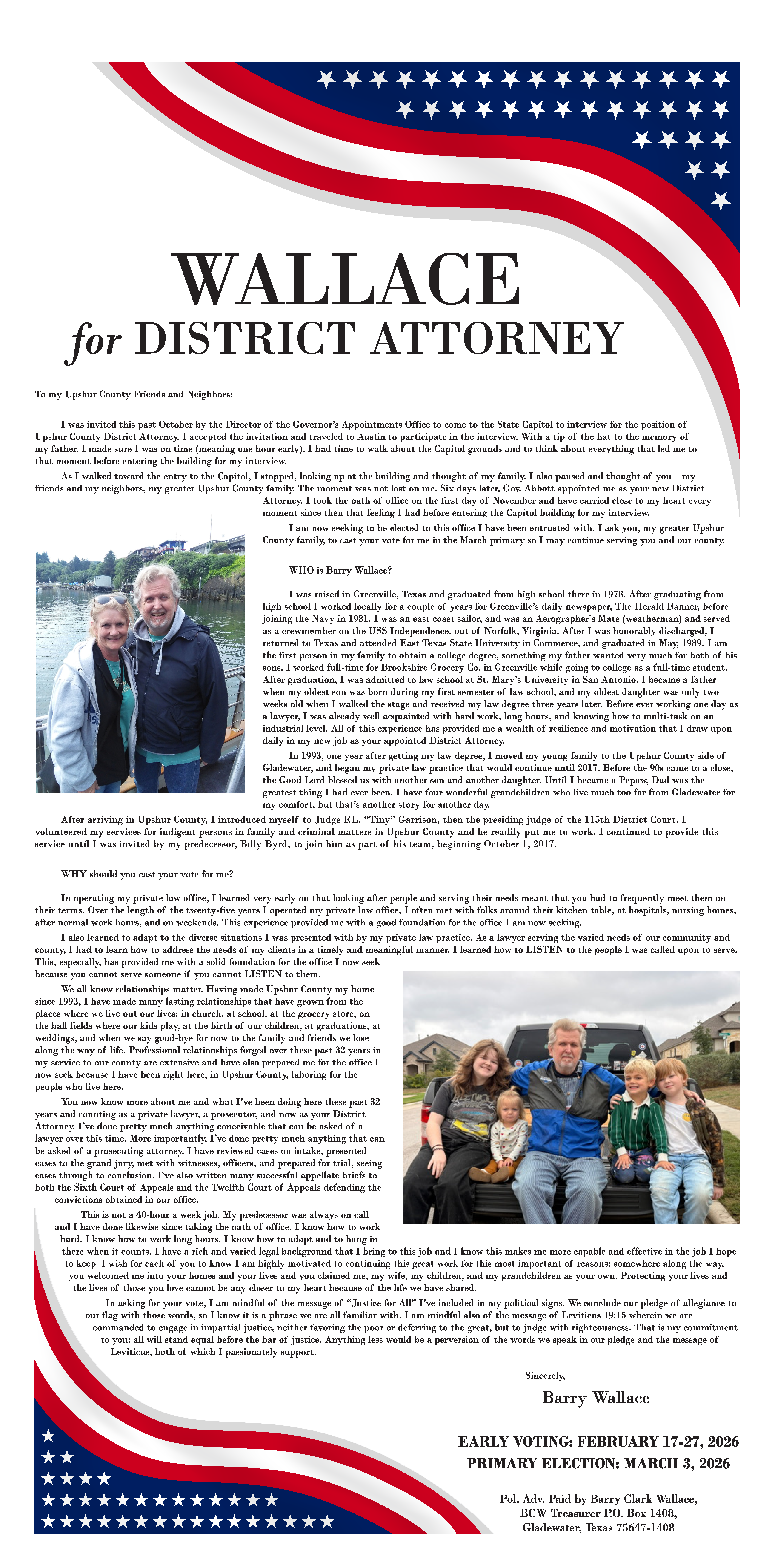Robert Early can cross ‘The Polar Plunge’ off his bucket list. In fact, that particular Antarctic activity gets its own new category: “Most fun to never have again.”
It’s a new core memory for the White Oak High School alum turned explorer alongside 35 other Texas A&M student-researchers and faculty members recently returned from the Earth’s southern ‘Frigid Zone.’
“I don’t know the temperature, but they’re the coldest waters you’ll ever find in the world that aren’t frozen,” Early said Jan. 12, now a bit less bothered by winter’s chill. “It was also extremely dark,” easily concealing the black-bodied creatures that live in those water.
As 2023 drew to a close, Early and his A&M colleagues spent more than a week and a half below the 60th parallel alongside the crew of the Ocean Victory and a pack of tourists. The researchers ventured out at least twice a day, excursions lasting an hour or two, alternating between time on land and on the water in inflatable Zodiac boats.
Overall, Early estimates he spent about two days on the landmass. Hundreds of photographs. Penguins. Seals. Sea birds. Stacks of data. It’s a lot to unpack in a single conversation or presentation, and Early’s hard at work collating and prepping his findings for publication for academics, fellow explorers, researchers and, hopefully, citizen scientists.
That was one of the many cornerstone takeaways from the Antarctic adventure, he says, the revitalization of his own drive to learn and the excitement of seeing others embrace it.
“That trip really reignited that passion, made sure I was pushing and striving forward for that next big discovery whether it’s a personal one or a new one for everybody,” he said. “Of course, I learned a lot about myself and the people around me. It was a very impactful trip.
“I’ve always been amazed and moved by ‘citizen science.’ The trip to Antarctica showed me how important that is,” and he devoted at least some of his observations to the thrill-seekers who accompanied the data-delvers to ‘The Ice.’ Both tourism and research are restricted and regulated on the globe’s seventh continent. “Moving forward, the vast majority of people will be tourists, not necessarily scientists.
He was gratified to see the tourists evolve into explorers: Every single one of those cruise ships started their own citizen science; little things like that can create huge amounts of data to help out.
“Citizen science is not just to create more data for science but to bring science to the average person. They were there to have a good time, but most of them forgot about that.”
The long journey south and the subsequent excursions on land and water provided unique insights into the remote region’s wildlife and the challenges posed by human presence.
“It was a beautiful place, one of the most beautiful places I’ve been to.” The group’s visit coincided with the beginning of the Antarctic summer: “It would get up to 40 on a good day,” he said. “The lowest it got while I was there was about 15°F.”
Beyond his academic preparations – research papers, meta analysis, literature review – Early revisited the “March of the Penguins” documentary from his childhood and reviewed accounts from the ‘Heroic Age of Antarctic Exploration’ from 1897 to 1922, such as Ernest Shackleton’s expedition from 1907-1909.
Early’s overarching goal was to study how the human presence affects species in Antarctica. From a cautious distance he observed species ranging from crabeater seals to chinstrap penguins and a variety of other birds.
“From a research perspective, one of the biggest things I noted was the active ignorance that penguins portray.” Beyond being naturally distracted by their food and other factors, the penguins seem to pointedly avoid noticing their two legged observes. “There’d be 20, 30, 100 penguins, and they wouldn’t be looking at us at all.
“There were some novel behaviors I saw as well, how they would look around for visible signs of terrestrial danger despite not having terrestrial predation.”
The seals exhibited some similar behaviors, Early added, but the humans didn’t go unnoticed.
“The adults ignored us because they’re several-ton beasts, but the ‘weaners’ (juveniles) were highly-responsive. They would respond whether they were in groups or alone,” including instigating ‘play’ fights to ward off the watchers. “People can cause a serious amount of stress for them.”
Early also kept an eye on the cape and arctic petrels, marine sea birds that follow sea vessels despite, as a species, only interacting with them for only a century or so.
“It’s kind of a novel behavior, of sorts. What I came to believe is it has more to do with the benefit of flying around the ship,” he said. “It was less for food benefit than using the air that rises off the ship so they can essentially fly around, glide around, without using any energy which is beneficial for them.”
Meanwhile, their observer paid for his curiosity: “I watched and it made me very motion sick. I threw up quite a bit, but it was worth it – for science, right?”
Certainly, he’s eager go back, perhaps approaching from the direction of New Zealand and getting a flyover of the Antarctic mountains. Early’s already made an initial presentation on his research and is compiling his results for publication.
“It was a lot of data, especially for each species that I saw” and will contribute to the pool of knowledge on the various species’ physical responses, behavior inventories and the human polices for approaching them. “Particularly when it comes to the ethnology, the study of animal behavior in Antarctica, it’s typically word of mouth. I would like to help expand on that with data on some of the actual behaviors you can witness and experience.”
Amid the reams of data, Early has plenty of anecdotes to share, but the Texas A&M student is also keen to pass on the broader lessons he brought home.
In particular, “I am no more qualified than you or anyone on the street to do what I did. I just had an idea, and I went forward and I pursued it,” he said. “If you have something you want to do, if you just step up and do it, doors will open.
“In the day to day, we kind of forget that and we give up on the dreams we have. It’s better to try. You’ll be surprised how well things go if you just do.”
If his research and his stories can spark someone else’s curiosity, Early’s all for it.
“As for the science part of things, there’s only so many natural places left in the world,” he said. “It’s important that we keep that in mind. You would be surprised how much you do in your own house affects environments around the world.”
Reduce what you can, Early added. Turn off the lights. Conserve.
“It’s very simple things, but they create an impact.”
– By James Draper








